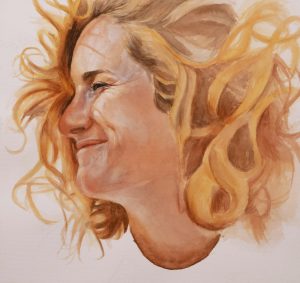
The Hard Way
You never know people
till they die
you gingerly page
through their privacy
Those fresh, fateful photos:
mothers in mauve miniskirts,
fathers frying hash browns, wearing floppy hats
After there is nothing at stake,
you find out all that you could have given
A little air comes in,
combats the forming mold that corrupted keepsakes,
contaminated these attic memories
This knowing threatens to sun the was
the is, now, will be more forgiving
A Whittenberg
Review by David Mehler
“The Hard Way” suggests that people exist, even those one knows most intimately, like father and mother, largely as islands shrouded in untold secrets like darkness. This appears to have something to do with the young being blind to and unable to perceive or understand the motivations of adults in their own context of adulthood? After they are dead and no longer with us, the attic or boxes of photos reveal something of the true person and the previously unguessed-at life of the other to the young who now have passed into their own adulthood: “A little air comes in, / combats the forming mold that corrupts the keepsakes,” and all “that you could have given” [underline mine] transforms into “this knowing [that] threatens to sun [or shed light on] the was / the is, now, will be more forgiving [italics mine].” Spoken like a son or daughter left behind, who is able to forgive now that they’ve lived enough to develop empathy and are offered some context they lacked before. What’s given and received or not given is at the basis of emotion and memory which transforms into a need/desire to forgive after a transaction of understanding takes place including the then child who experienced a parent and remains within, who has since become an adult later, remembering. Again, in Whittenberg’s poems, there’s a considerable amount of density and compaction going on in these short lyrics. Much poetic ability and knowledge of psychology on the part of the poet must be present in each of these poems to process this real or fictional family dynamic and history in such spare terms.
